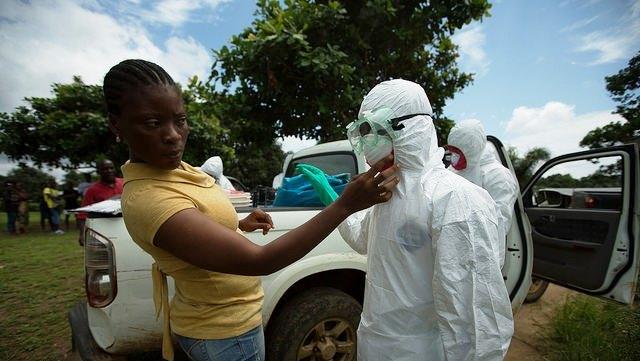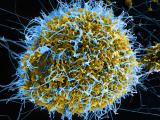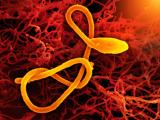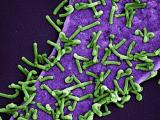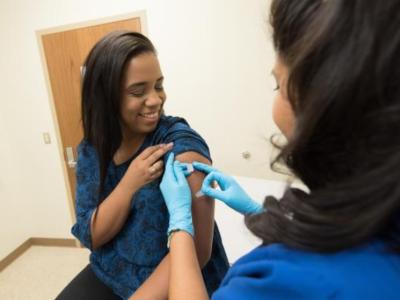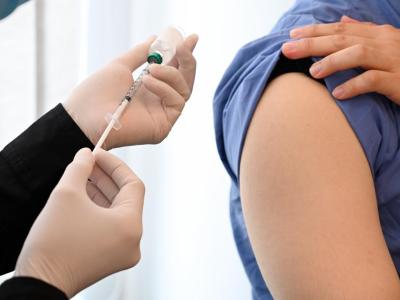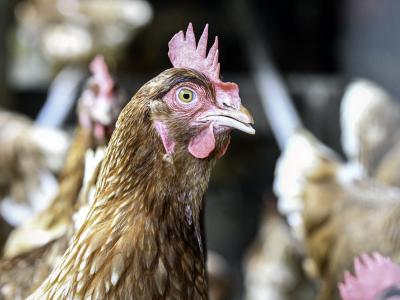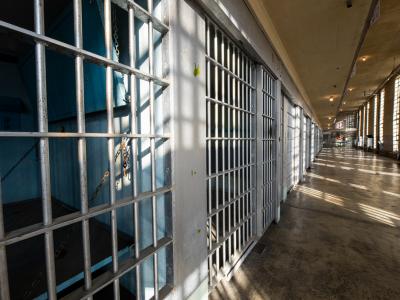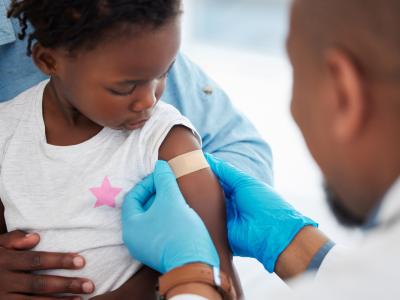The last region in Sierra Leone to be struck by Ebola now has had 50 deaths, the United Nations (UN) said today, in the wake of a warning from the top UN official to guard against complacency following reports of declining cases in some areas of the three hard-hit countries.
In other developments, Sierra Leone reported 111 Ebola cases yesterday, the highest daily count since August, according to a media report, while large new funding pledges were made by Japan and by the African Union in association with other African groups.
Also today, the World Health Organization (WHO) reported that the Ebola case in a 2-year-old Guinean girl who became Mali's first case-patient was preceded by a series of fatal cases in her family. The WHO said confidence is growing that her illness did not trigger any further spread in Mali.
Sierra Leone region hit after long resistance
In a situation report today, the UN Mission for Ebola Emergency Response (UNMEER) said Koinadugu, the last area of Sierra Leone to feel Ebola's impact, has had 50 deaths since mid-October. The region is a remote, mountainous, and "largely inaccessible" area in the country's northeast.
Sixty Ebola virus disease (EVD) cases have been confirmed in Koinadugu, and 200 people have been quarantined, UNMEER reported. It said the area previously had taken pride in being the last part of Sierra Leone unaffected by the epidemic.
Meanwhile, Sierra Leone's health ministry said 111 new Ebola cases were reported yesterday, the highest daily count since the ministry started publishing figures in August, the UK's Guardian newspaper reported today. That followed 45 cases reported the day before.
The numbers included a surge of cases in Port Loko, a district northeast of Freetown (the capital) that has no treatment center, the story said. The UN warned recently that up to half of Ebola cases in Sierra Leone were not being reported, the story noted.
Ban Ki-moon cautions against premature exuberance
In a Nov 7 Washington Post commentary, UN Secretary-General Ban Ki-moon warned against the danger of "declaring 'mission accomplished' too soon" in the Ebola crisis.
"The rate of new Ebola cases shows encouraging signs of slowing in some of the hardest-hit parts of Liberia, Guinea and Sierra Leone—and that's good news," Ban wrote. "The full-scale international strategy to attack Ebola through safe burials, treatment facilities, and community mobilization is paying dividends.
"But as caseloads go down in some areas, they are rising in others. Some of the worst-affected areas are now almost free of Ebola while neighboring districts are seeing numbers climb sharply. Beds may be empty in one facility while treatment centers are overflowing elsewhere."
Although the response to the epidemic has accelerated greatly, "huge gaps remain in funding, equipment and, most urgently, medical personnel," Ban wrote. "Each day's delay in intensifying the response adds greatly to the toll in lives, the cost of ending the outbreak, the social and economic impact, and the risk of the disease spreading to other countries."
"Now is no time to let down our guard," he warned. "We must keep fighting the fire until the last ember is out."
Liberian town reeling
Meanwhile in Liberia, a town of 300 people in Grand Cape Mount County near the Sierra Leone border has become a new epicenter for Ebola in the country, the Associated Press (AP) reported today.
The outbreak in the town of Jene-Wonde began when a teacher brought his sick daughter there from Monrovia, the capital, the story said. Soon he and his whole family succumbed to the disease. Momo Sheriff, a resident whose son died of Ebola, said the town has no healthcare and has lost 10% of its inhabitants to Ebola since late September.
Abdullai Kamara, the leader of Burial Team A of Grand Cape Mount County Ebola, said the people of Jene-Wonde have been stubborn and in denial about the disease, which he cites as the reason it is still spreading, according to the AP. Another local resident said he feared that without government help, the town will cease to exist.
Background of case in Mali
In following up on Mali's first Ebola case, the WHO issued a fairly lengthy statement today about earlier cases in the family of the 2-year-old Guinean girl who died of EVD in Mali on Oct 24, after being brought there by a relative.
The girl lived in the urban commune of Beyla, Guinea. The girl's father, a Red Cross worker who provided care at a private clinic owned by his own father (the girl's grandfather), got sick after contact with a sick farmer from another village on Sep 12. The father died of unknown causes on Oct 3, after going back to his native village.
The wife of the little girl's grandfather also fell ill and died of unknown causes on Oct 8, the WHO said. The next day two of the grandfather's other sons also got sick and were referred to an Ebola treatment center in Macenta; one of them died en route, and both subsequently tested positive for EVD, strongly suggesting that the other deaths were also due to Ebola.
The grandfather also got sick a few days after the two sons, and he died of EVD in Gueckedou on Oct 20, the report says.
After news of the deaths in the family, the 2-year-old's "grand aunt" (second wife of her maternal grandfather), who lives in Kayes, Mali, traveled to Beyla to offer condolences, the WHO reported. When she left Guinea on Oct 19, she took the little girl and her 5-year-old sister along, traveling by taxi and bus.
In Kayes the grand aunt took the girl to traditional healers and later to a hospital, where she tested positive for Ebola on Oct 23. She died the next day.
Thus far, Malian health officials and partner groups have identified 108 contacts of the little girl, including 33 healthcare workers, the WHO said. Of the 108, 25 have been followed for 21 days and released from surveillance. None of the contacts have shown signs of disease or tested positive for the virus.
"With persistent and thorough contact tracing, isolation, and monitoring in place, confidence is growing that no further spread within Mali followed exposure to the index case, who had haemorrhagic symptoms but no diarrhoea or vomiting during her travels," the agency said.
New pledges of support from Japan, Africa
On the funding side, Japan announced that it will make available an extra $100 million to aid the fight against EVD, according to today's UNMEER report. The pledge comes on top of a pledge of $40 million made by Prime Minister Shinzo Abe in September.
Japan also decided that, of the earlier $40 million, it will provide $4 million each to the governments of Guinea, Liberia, and Sierra Leone for medical and epidemic prevention equipment, the UN said. In addition, Japan will contribute $6 million to the UN Ebola Response Multi-Partner Trust Fund to support UNMEER's efforts.
On Nov 8 a coalition of African groups, including the African Union (AU), the African Development Bank, and business people announced a funding mechanism to help support African medical workers, with more than $28 million in initial pledges. The AU said in a statement that the funding plan came from a roundtable attended by chief executive officers from several sectors, including banking, telecommunications, mining, energy, services, and manufacturing.
They established the fund under the African Union Foundation through a facility managed by the African Development Bank, aiming to improve efforts to equip, train, and deploy health workers to help battle the disease in Guinea, Liberia, and Sierra Leone.
According to the AU, the business executives also committed logistical support and in-kind contributions. Business participants also agreed to build citizen action around a "United Against Ebola" campaign that would offer individuals in Africa and overseas an opportunity to donate.
DoD fleshes out quarantine details
In the United States, the Department of Defense (DoD) on Nov 7 announced new details about a mandatory 21-day controlled monitoring period for service members returning from West Africa's outbreak countries as part of Operation United Assistance.
As many as 4,000 soldiers could be deployed to assist with the global response. As of late October, about 700 troops had been sent to the region.
On Oct 29 DoD Secretary Chuck Hagel announced the 21-day monitoring period for all troops returning from the region and asked the Joint Chiefs of Staff to announce specifics in 15 days and review the system in 45 days. The DoD program is more stringent than the CDC's recommendations, which don't include mandatory quarantine for asymptomatic people.
Service members will be quarantined at one of seven bases—five in the United States and two in Europe. In a Nov 7 report the DoD said it selected the locations because of their proximity to medical facilities that can treat Ebola, do the required monitoring, and control access. They are:
- Fort Bliss, El Paso, Tex.
- Joint Base Langley-Eustis, Hampton, Va.
- Fort Hood, Killeen, Tex.
- Fort Bragg, Fayetteville, N.C.
- Joint Base Lewis-McChord, Wa.
- US Army Garrison Baumholder, Germany
- US Army Garrison Caserma Del Din, Vicenza, Italy
Military officials say the quarantine measures address the needs of service members and their families and that officials will assess and adapt the program as needed, according to the DoD report.
Africa Cup soccer may not have a host
In related news, Morocco has decided not to host the Africa Cup of Nations soccer tournament in January out of fear that fans would bring Ebola into the country, the Canadian Press reported today. The Moroccan government has been asking the Confederation of African Football (CAF) to postpone the tournament until June 2015, the story said.
CAF executives are due to meet tomorrow to decide the tourney's fate and may have to give up on it for 2015, according to the story. Four possible stand-in countries, South Africa, Sudan, Egypt, and Ghana, have also indicated they are not willing to host. It is unclear if any other countries met the Nov 8 deadline to offer to replace Morocco as the host.
News writer Lisa Schnirring contributed to this report.
See also:
Nov 10 UNMEER report
Nov 7 Ban Ki-moon commentary
Nov 10 Guardian story
Nov 10 AP story about Jene-Wonde outbreak in Liberia
Nov 10 WHO report on Mali case investigation
Nov 7 DoD News report
Nov 8 AU statement
Nov 10 Canadian Press story on soccer tournament
